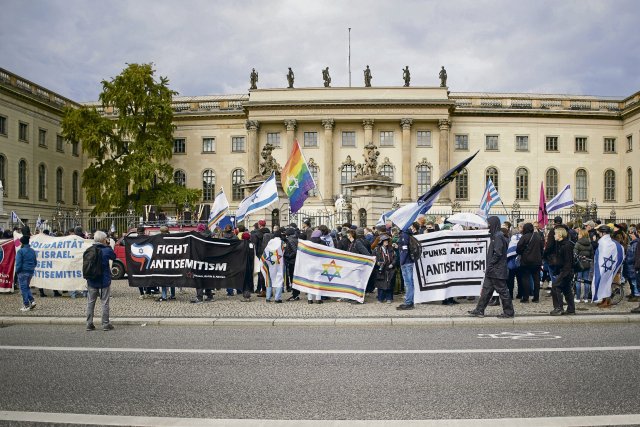On October 5, 2024, Antifa will mobilize in Berlin against the “authoritarian formation” and “anti-Semitic international”.
Photo: dpa/Jörg Carstensen
It is high time to “bring together the scattered discontent and the isolated critics” and build a “powerful anti-fascist resistance”. With this goal, the Gegenform alliance initiated the panel discussion “10/7 Aftermath: Anti-Semitism, Israel Solidarity and the Left after October 7th”. This took place on October 4, 2024 – a few days before the first anniversary of Hamas’ attack on Israel on October 7, 2023 – in Berlin’s Franz-Mehring-Platz 1. The alliance sees the current acceleration and consolidation of global anti-Semitism as “the preliminary climax of a general authoritarian formation.” The causes, manifestations and forms of development will be investigated at an Antifa congress on authoritarianism in spring 2025, the organizers said in their introduction to the discussion.
The specifically left-wing manifestation of anti-Semitism was the focus of the discussion event with Christian Voller, Christine Kirchhoff, Uli Krug and Lars Quadfasel, which was attended by 250 participants. The admittedly one-sided occupation of the podium with “ultra-Germans” – the malicious term for the scattered remnants of the anti-Germans, whose solidarity with Israel has become the supposed reason of state – is explained by the claim to use psychoanalytic, ideological, value and crisis theory approaches (Julian Bierwirth von Unfortunately, the group krisis for the last position could not take part). The aim was to represent the entire spectrum of the left critical of anti-Semitism and bring them into conversation with one another.
Desolate state of the left
The author Lars Quadfasel initially reported on his disappointed – and in retrospect certainly naive – hope that the bestiality of the Islamist massacre on October 7th might have been a turning point. Unfortunately, the initial revulsion did not last long and was all too quickly overshadowed by the idea that Hamas was a kind of “religiously motivated civil rights movement.” In view of the worldwide relativization and glorification of Hamas’ crimes, the German “elite consensus” against anti-Semitism is remarkable. But the (anti-)German special path could lead to self-righteousness, warned Quadfasel. Unpleasant truths about the conflict in the Middle East should not be ignored. In the spirit of solidarity with Israel, one must ask whether Israel’s military operations are still rational or whether they are merely delaying the long-overdue resignation of a “morally bankrupt government.”
nd.DieWoche – our weekly newsletter

With our weekly newsletter nd.DailyWords look at the most important topics of the week and read them Highlights our Saturday edition on Friday. Get your free subscription here.
Christine Kirchhoff did not want to share Quadfasel’s recognition of an “elite consensus” critical of anti-Semitism in Germany. The professor of theoretical psychoanalysis and subject and cultural theory at the International Psychoanalytic University (IPU) Berlin and practicing psychoanalyst expressed her resignation in view of the lack of solidarity reactions to the massacres of October 7th on both the civil and left sides. Even the scattered remnants of the anti-Germans cannot change the desolate state of the left in particular, which predominantly shows Israel-related anti-Semitism. One is “too old and too few”. In fact, the decidedly anti-fascist and Israeli solidarity demonstration “Against the Anti-Semitic International” that took place the following day only had 500 people. At least, says Kirchhoff, the “bourgeoisization of the anti-Germans” has led to corresponding positions being represented in the mass media. Overall, however, the media reporting on the conflict and the widespread perpetrator-victim reversal tend to promote anti-Semitism among the population rather than prevent it.
In his article, Uli Krug, journalist and editor of the weekly magazine “Jungle World,” attributed the left-wing support for Israel’s enemies to the right-wing occupation of Israel solidarity: “Left-wingers don’t go where right-wingers already are.” Nevertheless, the ideological differences between a postcolonial left and an ethnopluralistically arguing right lose meaning if leftists refer affirmatively to the revolutionary uprisings of supposedly autochthonous communities, indigenous peoples or oppressed nations. The Palestine solidarity left of the present is in a kind of “unconscious compulsion to repeat”: the unresolved theoretical deficits of the anti-imperialism of the Trikont left of the 1970s as well as the still existing conflicts based on nation-state competition mean that hope for change and romanticism for revolution are always becoming increasingly important were looking for new projection surfaces.
Irrationalism and psychologization
The illusory relationship of the “Metropolitan Left” (Voller) to the Palestinian autonomous areas was at the center of Christian Voller’s contribution, which revolved around the question of what the object of Palestine solidarity actually was. Voller, a research assistant at the Leuphana University of Lüneburg, identified an unrequited desire for (radical) change as the driving motive. Because there is no social progress and people don’t want to admit their own powerlessness and disappointment, they start looking for a replacement object. In the 2000s it was the “multitude” of the anti-globalization movement, then the occupations of the squares in the 2010s and finally the escape from the “largest open-air prison in the world” (Amnesty International). The affective occupation of a “liberated Palestine” is irrational because it has nothing to do with the actual conditions that would be expected if Hamas were to defeat the Israeli army. A liberated Palestine would be “theocratic, authoritarian Failed State“, says Voller. It is quite obvious that the Palestinian territories are “not on the path to emancipation,” which is why Western “Palestine solidarity is a disaster for the Palestinians.”
As an ideological processing of real powerlessness, anti-Semitism is essentially irrational.
–
The leitmotif of the evening was set with the pathologization of left-wing Palestine solidarity carried out by Kirchhoff, Krug and Voller. The rest of the event revolved around the question of how exactly irrationalism should be determined. As an ideological processing mechanism for real powerlessness, anti-Semitism is essentially irrational, Voller and Kirchhoff in particular insisted against the accusation of psychologization from the audience. However, while Voller and Sigmund Freud diagnosed a melancholic relationship between the left and Palestine, Kirchhoff saw more of a manic defense against the experience of loss or a general resistance to experience in parts of the left.
There was agreement on the panel that Palestine solidarity is about escaping from reality. Instead of an insight into the real contradictions, one takes refuge in the fantasy of a coming ideal world without contradictions – a longing that Quadfasel summarized as “intersectional harmony”, a peaceful coexistence of things that are inherently incompatible.
Rationality, postmodernism, practice
The audience’s reactions can be summarized in three points. On the one hand, the panel was accused of making things too easy for itself by declaring the irrationality of Palestine solidarity. In contrast, the search for rational reasons for action was required. This, the objection goes, requires more comprehensive knowledge of the “genocidal situation in Gaza.” Because the anti-Germans cannot or do not want to recognize the reality of the violence emanating from Israel, they portray the critical reactions to the IDF’s actions as irrational. In short: the accusation of denial of reality directed against Palestine solidarity also applies to the people on the podium.
Secondly, the panel objected that their conceptual apparatus, which came from classical modernity, misunderstood the specifics of the Palestine solidarity movement as “applied postmodernism”. For example, the traditional contrast between freedom and bondage in conceptual history is not at all able to capture the fact that the utopia of a “Free Palestine” also means the complete leveling of the liberal distinction between (individual) liberation and (collectivist) subordination.
Thirdly, concrete practice was called for over theoretical attempts at explanation. It is important to publicly denounce places and institutions where Islamist ideology is preached. There was applause for a criticism of the “convenience of a complacent Bajszel left,” in reference to the left-wing Berlin bar that was recently the target of an arson attack. Instead of airy mental constructs, this should rather specifically name and combat the actors, structures and institutions of this propaganda. In keeping with the stated “bourgeoisization of the anti-Germans” (Kirchhoff), the panel participants advocated “baking smaller rolls” in political practice (Krug). The local political commitment to concrete goals (Kirchhoff mentioned, for example, higher wages, free health care and overcoming the housing shortage) does not contain any “revolutionary glamor” (Krug), but in contrast to fantasies of redemption it is at least rational and realistic. Nevertheless, critical thinking should not be sacrificed for realpolitik. According to Kirchhoff, “the contradictions of civil society” must be considered, i.e. that “what exists negatively contains the possible.”
Subscribe to the “nd”

Being left is complicated.
We keep track!
With our digital promotional subscription you can read all issues of »nd« digitally (nd.App or nd.Epaper) for little money at home or on the go.
Subscribe now!
sbobet88 link sbobet judi bola online judi bola
